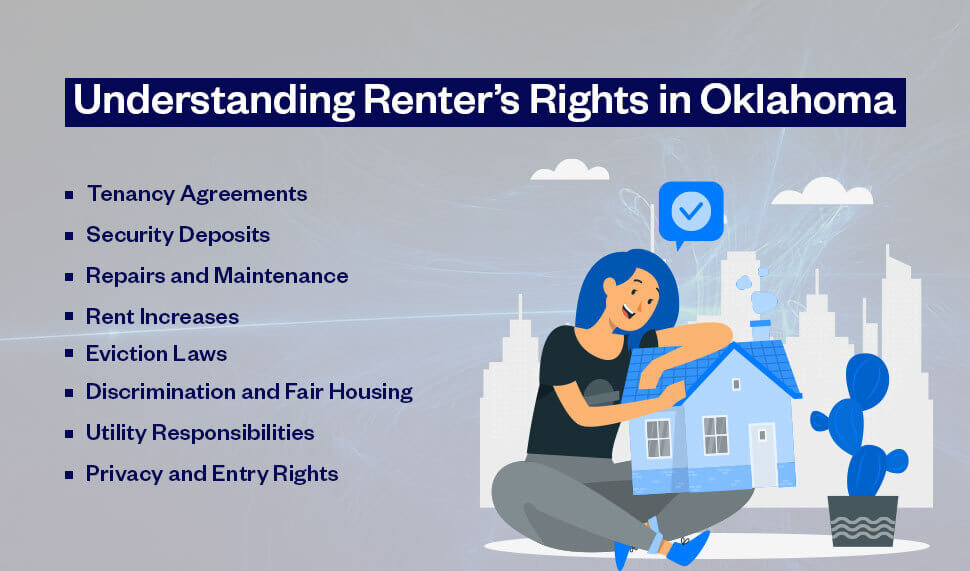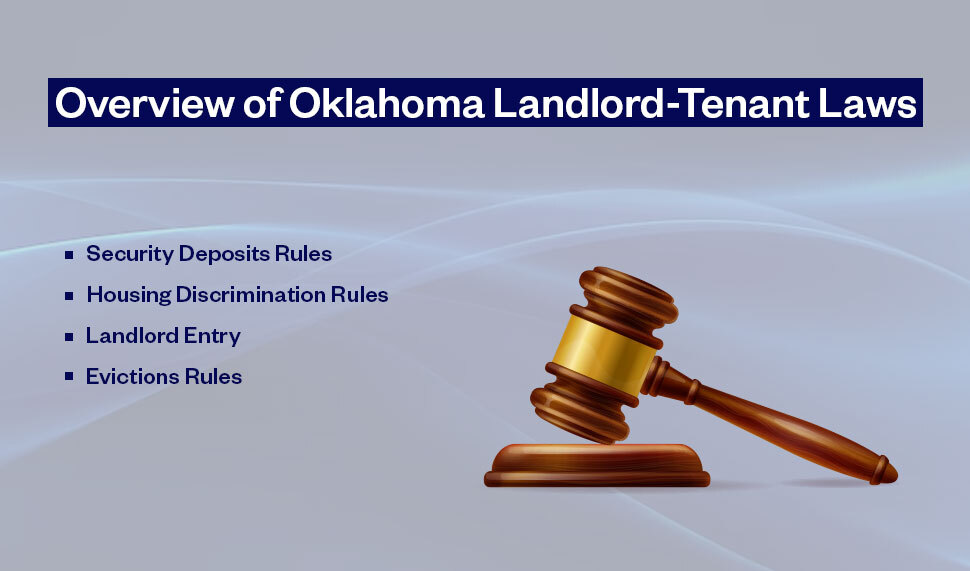Renting a home, or managing one, comes with a lot of moving parts. And let’s be honest: things can get confusing fast if you’re not clear on the rules. That’s why understanding tenant’s rights in Oklahoma as well as your rights and obligations as a landlord is so important, not just to protect your property, but to run your rental business smoothly and legally.
At OKC Home Realty Services, I’ve spent over a decade managing rental properties across Oklahoma City and neighboring metro areas, and in that time, I’ve seen just about everything, from security deposit disputes to maintenance mix-ups. I know how quickly small misunderstandings can snowball into big headaches for both tenants and landlords. The good news? Most of these issues are completely avoidable when everyone understands their rights and responsibilities upfront.
This article breaks down the most important Oklahoma renter’s rights and landlord responsibilities so you can stay informed, confident, and legally protected in every step of the rental process.
Maximize Your Rental Income with Hassle-Free Property Management
Request a Service →Understanding Oklahoma Renters Rights
As a landlord, knowing your renter’s rights is crucial while renting in Oklahoma. Whether it’s your first time renting an apartment here or you’ve rented houses in OKC forever – some essential laws and protections apply to you. This empowers you to make the best decisions as a landlord and avoid conflicts or missteps that could cost you. That way, you can enjoy renting without unnecessary stress or worry. Here’s what every Oklahoma landlord needs to know:

Tenancy Agreements
Creating a well-defined tenancy agreement, also known as a lease agreement or residential lease, is the foundation of a successful landlord-tenant relationship. The agreement should clearly outline the lease terms and conditions of the tenancy, including the rent amount, lease duration, and any additional provisions or restrictions. By ensuring that the tenancy agreement is comprehensive and legally sound, both landlord and tenant can establish clear expectations from the beginning.
Security Deposits
In Oklahoma, the landlords are permitted to collect security deposits from their respective tenants. The tenant’s security deposit serves as a safeguard against unpaid rent, damages beyond normal wear and tear, or lease violations. Security deposits must be held in a federally insured account, separate from the landlord’s personal funds, to ensure legal compliance and transparency. It is crucial to understand the legal requirements regarding security deposits, such as the maximum amount allowed and the timeframe for returning the deposit after the tenant moves out. When returning the deposit, landlords must provide a written statement and an itemized statement detailing any deductions or repair costs. By adhering to these rules and regulations, landlords can avoid potential disputes and legal issues.
Repairs and Maintenance
Maintaining a habitable and well-maintained rental property is a fundamental responsibility of landlords in Oklahoma. It is important to promptly address any necessary repairs or maintenance requests from tenants. By being proactive in this regard, landlords can ensure the safety and comfort of the tenants while also preventing potential conflicts and legal complications.
Rent Increases
The landlords in Oklahoma have the right to increase the rent, but they must provide proper notice to their tenants. The notice period can vary based on the lease agreement and duration. Familiarizing yourself with the regulations surrounding rent increases will help you navigate this process smoothly and maintain a positive relationship with your tenants.
Eviction Laws
It is crucial for the landlord to have an understanding of the eviction laws in Oklahoma. While eviction is always should be a last resort, there are some valid reasons for opting for this course of action, such as nonpayment of rent or lease violations. The landlord should always follow the correct legal procedures, including providing proper written notice and obtaining a court order. By adhering to these laws, landlords can protect their rights as well as the tenant’s rights.
Discrimination and Fair Housing
As a landlord, it’s essential to follow fair housing practices and ensure that all tenants are treated equally. Under the Fair Housing Act, it’s illegal to discriminate based on race, color, religion, sex, national origin, familial status, or disability. In Oklahoma, these protections are also enforced by the Oklahoma Human Rights Commission, which serves as the authority for addressing housing discrimination and providing resources for filing complaints. To stay compliant and build trust, landlords should apply consistent standards and treat all applicants and tenants fairly, without bias, prejudice, or favoritism.
Utility Responsibilities
Clarifying the responsibilities of utilities between the landlords and tenants is essential to avoid misunderstandings. You should clearly define who is responsible for payment and maintenance of utilities, such as electricity, water, gas, and internet services, which will prevent disputes and ensure a smooth rental experience. Include these details in the rental agreement to establish transparency and avoid confusion.
Privacy and Entry Rights
As a landlord, you should always respect your tenant’s privacy. While the landlord has the right to access the property for regular inspections or repairs, it is crucial to provide proper notice and obtain consent from your tenants. The Oklahoma law typically requires the landlords to give at least 24 hours notice before entering the rental unit, except in cases of emergencies. By respecting your tenants’ privacy, you can foster a sense of trust and maintain a positive landlord-tenant relationship.
[Also Read: Can Tenants Install a Security System Without Landlord Permission]
Oklahoma Landlord Rights & Responsibilities
As a landlord, you will always have certain responsibilities towards your tenants. These include maintaining the property in a habitable condition, ensuring essential services are functioning properly, and addressing all kinds of repairs and maintenance requests promptly. Also, landlords are responsible for complying with the building and safety codes, providing adequate trash disposal facilities, and maintaining common areas, if applicable. By fulfilling your landlord responsibilities well, you can create a comfortable environment for your tenants and minimize potential disputes.

Property and Building Codes: Property owners are required to comply with local property and building codes to ensure that the rental property meets all standards like health, safety, and habitability. This may include maintaining proper electrical, plumbing, and heating systems, as well as ensuring adequate fire safety measures are in place.
Rental Agreements: Landlords are also typically responsible for preparing and maintaining written rental agreements or leases that outline the terms and conditions. The agreements should comply with relevant laws, clearly state the rights and responsibilities of both parties, and address important aspects such as rent payments, security deposits, and maintenance procedures.
Insurance and Liability: Landlords should carry appropriate insurance coverage to protect themselves and the rental property. This may include property insurance, liability insurance, and, in some cases, landlord-specific insurance policies. Also, get to know whether renters insurance covers displacement.
Recommended: Learn more about Oklahoma renters insurance.
Tax Obligations: Landlords are required to follow local and federal tax laws by reporting all rental income on their annual tax returns. In addition to income reporting, landlords may qualify for valuable tax deductions, including those related to property maintenance, repairs, insurance, depreciation, and even management fees.
It’s also important to stay informed about property tax rates, which can vary depending on location and property type. For more details on how local tax rates may affect your rental property, check out the article Oklahoma property tax rates.
Legal Obligations and Compliance of a Landlord
Operating as a landlord in Oklahoma requires compliance with the relevant laws and regulations. It is essential to be familiar with the Oklahoma Residential landlord tenant act, as well as any local ordinances that may apply. By understanding and adhering to these legal obligations, you can protect yourself from potential legal consequences and ensure a smooth rental experience for both landlord and tenant.
Maximize Your Rental Income with Hassle-Free Property Management
Request a Service →Oklahoma Tenant Rights to Withhold Rent
In Oklahoma, renters’ rights also grant tenants the right to withhold rent under certain circumstances, although these conditions are limited. Here are a few examples of such circumstances:

Repairs: If there are significant repairs that need to be made to the rental unit, and the landlord has been notified of issues but fails to address them within a reasonable time, the tenant may have the right to withhold rent. However, before withholding rent, it is generally advisable to follow proper legal procedures, such as providing written notice to the landlord and giving them a reasonable opportunity to make the repairs.
Uninhabitable conditions: If the rental unit becomes uninhabitable due to severe conditions that affect the tenant’s health or safety, the tenant may be able to withhold rent. Examples of uninhabitable conditions could include a lack of heating or hot water, severe pest infestations, or major structural damage. Again, it is crucial to follow proper legal procedures and provide written notice to the landlord before withholding rent.
Landlord retaliation: If a landlord attempts to retaliate against a tenant for exercising their legal rights, such as reporting code violations or joining a tenant organization, Oklahoma law may provide protection to the tenant. In such cases, the tenant might have the right to withhold rent as a defense against any eviction proceedings initiated by the landlord.
Here take a look at things that a landlord cannot do while renting out.
Required Disclosures Oklahoma Landlords Must Provide
When renting out property in Oklahoma, landlords must ensure tenants receive proper disclosures. It is important for compliance according to the Oklahoma Landlord Tenant Act. This can help renters understand their rights better.
Lead-Based Paint Disclosure: If the homes are built before 1978, they have more chance of lead-based paint. It can lead to a health risk. So landlords must disclose information about lead-based paint hazards to the tenants.
Asbestos Disclosure: The landlord must disclose this information to tenants in writing if asbestos is present in the rental property.
Methamphetamine Contamination: Landlord has a legal obligation to disclose if their property was used as a lab for making methamphetamine drugs and decontamination was not performed.
Sex Offenders Notice: A notice must be provided to prospective tenants if any registered sex offenders reside in the vicinity.
Pest Infestation Disclosure: Pest Infestation also has to be informed to the tenant. Is there any history of bed bugs in the past 12 months in the rental unit, inform them immediately about the importance of pest control for happy living. Get to know who is responsible for pest control when renting.
Overview of Oklahoma Landlord-Tenant Laws

Security Deposits Rules:
Oklahoma landlords and tenants are legally bound by the state’s security deposit rules. Landlords can charge up to 2 months’ rent and must store that security deposit in an escrow account. After the tenant moves out, landlords are obliged to refund that security deposit within 30 days of the time period.
Housing Discrimination Rules:
The landlord has no monopoly power for renting out a property to the tenant. The Fair Housing Act binds the hands of landlords to make decisions discriminating the tenants. The landlord must treat the tenant with respect without any judgment on the basis of
any race, culture, color, status, gender, nationality, or disability. Refusing tenants with prohibited criteria can trouble the tenants by law.
Landlord Entry:
Every tenant’s privacy must be handled properly by landlords. Whenever the landlord wants to perform an inspection of the rental unit, a notice has to be provided as information to the tenants before the premises entry. At least 24 hours should be maintained to aware tenants. In case of emergency situations, this is not mandatory.
Evictions Rules:
If the tenants are troubling landlords with actions violating the rental agreement, landlords can evict them after communicating properly. An eviction notice must be compulsorily provided. Depending on their action, landlords can take the Oklahoma eviction process a notch higher by heading over to court.
Recommended Article: Section 8 Eviction Process
Conclusion on Tenant’s Rights Oklahoma
Understanding renters’ rights in Oklahoma is crucial for landlords to establish and maintain a successful and legally compliant rental business. By familiarizing yourself with the various aspects of tenant rights, you can create a fair and transparent landlord-tenant relationship, avoid legal pitfalls, and provide a safe and comfortable living environment for your tenants. Remember to stay updated on relevant laws, adhere to your responsibilities, and seek assistance or guidance when needed. By doing so, you can be a responsible and respected landlord in the state of Oklahoma.
Contact OKC Home Realty Services if you have any queries regarding landlord-tenant laws in Oklahoma state.
Maximize Your Rental Income with Hassle-Free Property Management
Request a Service →FAQs on Oklahoma Renters Rights
What are the renters' rights in Oklahoma?
Renters in Oklahoma have the right to a safe, habitable home, privacy, timely repairs, and protection from unlawful eviction or discrimination.
Can I evict a tenant without a valid reason?
No, landlords in Oklahoma cannot evict tenants without a valid reason. Valid reasons may include non-payment of rent, lease violations, or the expiration of a lease term. It is essential to follow proper legal procedures and obtain a court if necessary. Thus, get to know about legal reasons to evict a tenant.
How much notice should I give before entering the rental property?
Oklahoma law typically requires landlords to give at least 24 hours notice before entering the rental unit, except in case of emergencies. You should respect your tenant’s privacy that’s why providing proper written notice and obtaining consent is important.
Can a landlord increase the rent whenever they want?
While landlords in Oklahoma have the right to increase rent, proper notice must be given to tenants. The notice period may vary based on the lease agreement and duration. Review the terms of the lease and adhere to the regulations regarding rent increases.
What should I do if the tenant requests repairs?
It is your responsibility as a landlord to address necessary repairs promptly. You should respond to your tenant’s repair requests in a timely manner and ensure that the rental property remains in a habitable condition.

Author
Scott Nachatilo is an investor, property manager and owner of OKC Home Realty Services – one of the best property management companies in Oklahoma City. His mission is to help landlords and real estate investors to manage their property in Oklahoma.
 (
(









